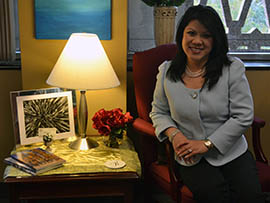Schools: Law requiring personal finance instruction won’t change much

Cronkite News
When Mitch Ruttenberg teaches economics at Trevor G. Browne High School, he ends each semester with lessons on credit cards, taxes, budgeting and other aspects of personal finance.
“It’s last thing they get from me because I know that’s what they need the most,” he said.
Because his and other economics classes in the Phoenix Union High School District provide that instruction, Ruttenberg said a new state law requiring academic standards in social studies to include personal finance won’t change much.
While the law prescribes teaching subjects like spending, saving, investments and credit, school districts have flexibility when developing their lessons.
State Sen. Kimberly Yee, R-Phoenix, the law’s author, said many districts are well-prepared to comply.
“Many of them already told us that the skill sets are already there, they just need to open up the curriculum a little bit more,” she said.
Personal finance lessons are important for children, Yee said.
“As we grow into adulthood, these are the same skills that we have to have in our own households,” she said, “so the earlier we teach these simple, basic skills, I think the better off society will be.”
Chris Kotterman, the Arizona Department of Education’s deputy associate superintendent of policy development and government relations, said financial literacy is already included in the Arizona’s social studies standards.
The new law, he said, re-emphasizes that districts should focus on financial literacy.
“Anytime the Legislature sort of passes a bill that typically calls something out, it sort of drops a marker for school districts and charters that, ‘Hey, you need to pay attention to this,’” Kotterman said.
He said the Department of Education isn’t tasked with enforcing the law but it will provide resources, such as suggestions of nonprofit groups that specialize in personal finance instruction.
Yee said making personal finance instruction part of state law prevents it from being dropped should state education standards change.
“We placed it in the law so that it will forever be there,” she said.
Julie Landers, a math teacher at Mesa High School, part of Mesa Public Schools, said it’s a good idea to let school districts determine specific lessons.
“Depending on where you are, you want to be able to tailor it to the groups of kids you have,” she said.
The district has personal finance math classes, but students fulfill the financial literacy requirement through economics classes, Landers said.
JoDee Pennock, a business teacher at Liberty High School in Peoria, said business teachers in the Peoria Unified School District are fighting to have the personal finance requirement included in their classes because they cover the required topics.
“I think a business teacher is going to hit the more financial part of it where often times an economics class is being taught by a history teacher, which takes a more historical role,” Pennock said.
Even though the school districts are responsible for the curriculum, Yee has things she’d like to see taught.
“We certainly encourage the basic skills of managing your money, understanding debt, understanding how to hold a credit card, managing your checkbook, little basic skills,” she said.
Michael Cummiskey, a chartered financial consultant in Paradise Valley, said new law is good but that parents are the most important personal finance teachers. That can start with educating children about the family budget.
“Let them get involved in what things cost because a lot of times kids don’t even understand what the real costs are,” he said.















